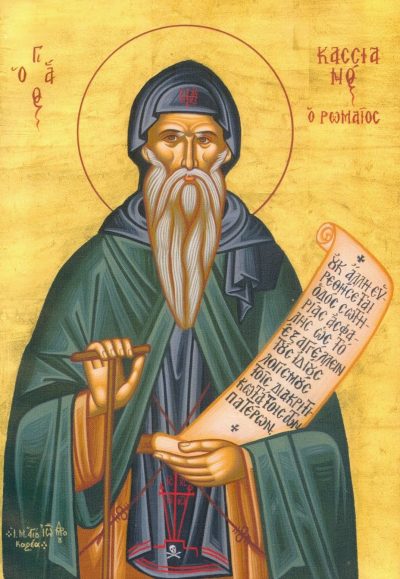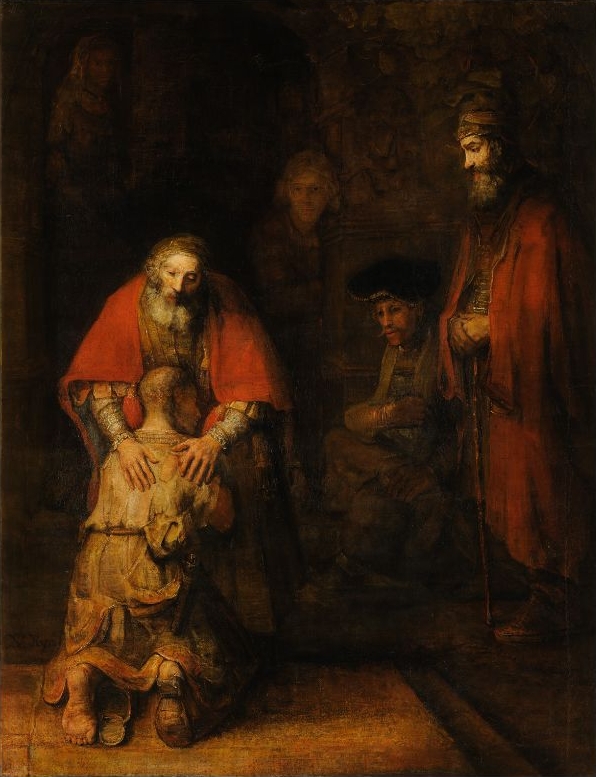PROLOGUE (VI) Lord, who shall dwell in thy tabernacle?
6 Jan. 7 May. 6 Sept.
Since then, brethren, we have asked of the Lord who is to inhabit His temple, we have heard His commands to those who are to dwell there and if we fulfil those duties, we shall be heirs of the kingdom of heaven. Our hearts, therefore, and our bodies must be made ready to fight under the holy obedience of His commands; and let us ask God to supply by the help of His grace what by nature is not possible to us. And if we would arrive at eternal life, escaping the pains of hell, then – while there is yet time, while we are still in the flesh, and are able to fulfil all these things by the light which is given us – we must hasten to do now what will profit us for all eternity.
With today’s section of the Prologue, we enter into a kind of recapitulation of all that Saint Benedict has said thus far. Saint Benedict would have his monks see themselves as those who dwell in the temple of the Lord. In our ceremony for the welcoming of a postulant, once the postulant has knelt on the threshold of the monastery, and kissed the crucifix presented to him, the prior leads him into the Oratory while the brethren chant Psalm 83:
How lovely are thy tabernacles, O Lord of hosts!
my soul longeth and fainteth for the courts of the Lord.
My heart and my flesh have rejoiced in the living God.
For the sparrow hath found herself a house,
and the turtle a nest for herself where she may lay her young ones:
Thy altars, O Lord of hosts, my king and my God.
Blessed are they that dwell in thy house, O Lord:
they shall praise thee for ever and ever. . . .
Better is one day in thy courts above thousands. I have chosen to be an abject in the house of my God, rather than to dwell in the tabernacles of sinners. (Psalm 83:2–5, 11)
Yesterday, Saint Benedict took up the dialogue of Psalm 14, in which the man who aspires to dwell in the tabernacle of the Lord asks:
Lord, who shall dwell in thy tabernacle? or who shall rest in thy holy hill?
The Lord’s answer was quick in coming:
He that walketh without blemish, and worketh justice: He that speaketh truth in his heart, who hath not used deceit in his tongue: Nor hath done evil to his neighbour: nor taken up a reproach against his neighbours. (Psalm 14:2–3)
The virtuous life set forth here in Psalm 14 can be summed up in the beatitude: “Blessed are the clean of heart: for they shall see God.” (Matthew 5:8) Saint John Cassian presents purity of heart in terms of freedom from the domination by sin and the recovery of inward peace. The purity of heart described in Psalm 14 comes into focus in the Beatitudes. Here, again, we have an example of the psalms as a preparation for the Gospel and the psalms as the Gospel turned into prayer.
Saint Benedict’s monk, then, is one who dwells in the temple. He abides in the temple. Here, we approach the whole Johannine mysticism of abiding–in.
Abide in me, and I in you. As the branch cannot bear fruit of itself, unless it abide in the vine, so neither can you, unless you abide in me. I am the vine; you the branches: he that abideth in me, and I in him, the same beareth much fruit: for without me you can do nothing. If any one abide not in me, he shall be cast forth as a branch, and shall wither, and they shall gather him up, and cast him into the fire, and he burneth. If you abide in me, and my words abide in you, you shall ask whatever you will, and it shall be done unto you. In this is my Father glorified; that you bring forth very much fruit, and become my disciples. As the Father hath loved me, I also have loved you. Abide in my love. If you keep my commandments, you shall abide in my love; as I also have kept my Father’s commandments, and do abide in his love. (John 15:5–10)
To abide in Christ, keeping His commandments, is to abide in the temple. Implicit in Saint Benedict ‘s presentation of the monastic life as “dwelling in the temple” as “heirs of the kingdom of heaven” is, I think, all that, in the old dispensation, pertains to the ritual purity of the priests in the service of the temple at Jerusalem. The monk, according to Saint Benedict, seeks, above all, to abide in the temple, to make his home in the tabernacle of the Lord, where, as we shall see in Chapter XLIII, he “prefers nothing to the Work of God”.
To abide in the temple, by day and by night, is to abide in Christ, for Christ Himself is the temple, as Saint John makes clear: “But he spoke of the temple of his body” (John 2:21), and again in the Apocalypse concerning the heavenly Jerusalem: “And I saw no temple therein. For the Lord God Almighty is the temple thereof, and the Lamb” (Apocalypse 21:22). One who would make his home in the temple must be holy, for the psalmist says, “Holiness becometh thy house, O Lord, unto length of days” (Psalm 92:5). What follows in the same chapter 21 of the Apocalypse corresponds to what Saint Benedict says in the Prologue:
Since then, brethren, we have asked of the Lord who is to inhabit His temple, we have heard His commands to those who are to dwell there and if we fulfil those duties, we shall be heirs of the kingdom of heaven.
And in the penultimate chapter of the Apocalypse we read:
There shall not enter into it any thing defiled, or that worketh abomination or maketh a lie, but they that are written in the book of life of the Lamb. (Apocalypse 21:27)
The vocabulary of today’s section of the Prologue is gloriously eschatological: temple, kingdom of heaven, eternal life, pains of hell, eternity. The same language will recur in the eschatological series of the Instruments of Good Works in Chapter IV:
44. To fear the Day of Judgment.
45. To be in dread of hell.
46. To desire with a special longing everlasting life.
47. To keep death daily before one’s eyes.
48. To keep guard at all times over the actions of one’s life.
Saint Benedict is saying, in essence, what the Apostle wrote to the Colossians:
Therefore if you be risen with Christ, seek the things that are above; where Christ is sitting at the right hand of God. Mind the things that are above, not the things that are upon the earth. For you are dead; and your life is hid with Christ in God. When Christ shall appear, who is your life, then you also shall appear with him in glory. Mortify therefore your members which are upon the earth; fornication, uncleanness, lust, evil concupiscence, and covetousness, which is the service of idols. (Colossians 3:1–5)
In the end, Saint Benedict’s monk is called not only to abide in the temple — and the temple is Christ — but to become part of the temple, a living stone. The Apostle says, “For the temple of God is holy, which you are” (1 Corinthians 3:17), and again:
You are no more strangers and foreigners; but you are fellow citizens with the saints, and the domestics of God, built upon the foundation of the apostles and prophets, Jesus Christ himself being the chief corner stone: In whom all the building, being framed together, groweth up into an holy temple in the Lord. In whom you also are built together into an habitation of God in the Spirit. (Ephesians 2:19–22)


